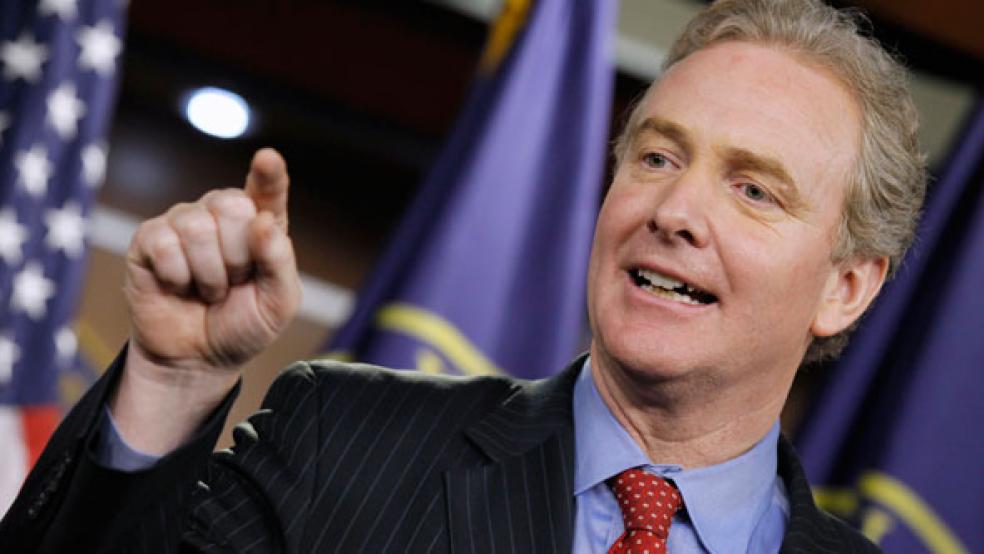When the newly elected Senate takes office in January, the upper chamber will have a striking new look to it, with younger and more moderate members taking their seats – including five women.

Once primarily the domain of older, wealthy white males, the Senate gradually is taking on the look of the coalition that helped to reelect President Obama last week, including minorities, women and young people.
Senate Majority Leader Harry Reid, D-Nev., said after the election that the Democrats were able to expand their majority by two seats because “We’re the party of diversity.” With independent senator-elect Angus King Jr. of Maine and independent Bernie Sanders of Vermont., all but certain to caucus with the Democrats, Reid and his party will hold a 55 to 45--seat majority over the Republicans.
While Democrats will still be five votes short of a 60-vote super majority needed to overcome a Republican filibuster, the new majority should be enough to give Reid some running room in negotiations over budget and tax policy next year while providing Obama with a firewall against GOP attacks on his health care and Wall Street reforms.
“On balance I think it would have to be seen as a more moderate group,” said Ross Baker, a Rutgers University political scientist. “There are certain outliers. I think that [conservative Republican senator-elect] Ted Cruz of Texas is balanced off by Elizabeth Warren in Massachusetts. But the rest of them seem to be much more to the center.”
Reid’s caucus becomes much more diverse with the first openly gay senator (Tammy Baldwin of Wisconsin) and a fierce member of the “Blue Dog” Democratic coalition (Joe Donnelly of Indiana). The total number of women in the Senate will rise to 20 – the largest number in history. In addition to Baldwin, Democrats Warren, the Harvard Law professor and consumer advocate, Mazie Hirono of Hawaii, Heidi Heitkamp of North Dakota, and Republican Deb Fischer of Nebraska boost the numbers.
Democrats picked up Republican-held seats in Indiana, Maine and Massachusetts and no incumbent Democratic senator lost reelection. Republicans picked up Democratic-held Nebraska, where Sen. Ben Nelson was retiring.
Here are the 12 new faces in the Senate:
Arizona – Rep. Jeff Flake – Republican
The six-term congressman made his reputation by opposing earmarks and showing a willingness to criticize fellow Republicans. His opposition to earmarks led GOP leaders to strip him of a position on the House Judiciary Committee in 2007. The 48-year old Mormon heads to the Senate to succeed the retiring John Kyl. A former executive director of the Goldwater Institute with libertarian leanings, Flake campaigned on cutting the deficit.
Connecticut – Christopher S. Murphy – Democrat
With three terms in the House under his belt, the Democrat bested former wrestling executive Linda McMahon in order to succeed Joe Lieberman in the Senate. Murphy, 39, worked his way into Washington through the Connecticut statehouse. The National Journal gave him a 73 percent score for “liberal on economic policy,” while the American Conservative Union assigned him a lifetime score of 2 percent.
Hawaii – Mazie K. Hirono – Democrat
This 65-year old Hirono is the first senator to identify herself as Buddhist and to have been born in Japan. Hirono was elected to the House in 2006 and moved across Capitol Hill on a platform that stressed clean energy and early-childhood education. Americans for Democratic Action gave her a 95 percent rating.
Indiana – Rep. Joe Donnelly – Democrat
The “Blue Dog” Democrat beat Tea Party darling Richard Mourdock to claim a Senate seat that had been held by Republican Richard Lugar for 36 years. After Mourdock defeated Lugar in the GOP primary, the 57-year old congressman with a record of opposing abortion and gun control became more appealing to Indiana swing voters. Donnelly will be among the more conservative Democrats in the Senate, having come out in support for a one-year extension of the Bush-era tax cuts.
Maine – Former governor Angus King Jr. – Independent
King, 68, served as the 72nd governor of Maine from 1995 to 2003. He ran for the Senate as an independent, to fill the seat of retiring Republican Sen. Olympia Snowe. Although he has been cagey about which party he would caucus with in the Senate, King is widely expected to align himself with the Democrats. He is an environmentalist who opposes drilling in the Arctic National Wildlife Refuge, calls for strict environmental safeguards on fracking and construction of the Keystone XL pipeline, backs same-sex marriage and favors reforms of the Senate filibuster rule.
Massaschusetts – Elizabeth Warren
Warren, 63, a Harvard Law School professor and expert on bankruptcy law, catapulted to national prominence as a sharp critic of Wall Street practices that led to the financial meltdown and as a consumer advocate who helped the Obama administration establish the U.S. Consumer Financial Protection Bureau. She gained notoriety with a stirring speech at the Democratic National Convention last summer, and unseated Republican Sen. Scott Brown with an aggressive campaign and huge war chest. She reportedly is angling for a seat on the Senate Banking Committee. The big question is whether the highly outspoken liberal will take a low profile during her first year in the Senate and build bridges to the Republicans -- as Hillary Clinton did when she was first elected to the Senate – or try to make a big splash early on.
Nebraska – Deb Fischer – Republican
Fischer, 61, is a member of the Nebraska Legislature. During the primary campaign, she was criticized by environmentalists and others because her family's ranch grazes cattle on federal land, leasing it for about $110,000 per year less than the market rate on private land. Fischer argued that the poor quality of federal lands, plus the restrictions that come with federal leases, make it inappropriate to compare them to private leases. She defeated former Nebraska senator Bob Kerry (D) in the general election and will succeed retiring Democrat Ben Nelson.
New Mexico – Martin T. Heinrich – Democrat
Heinrich, 41, is a former Democratic House member and member of the Albuquerque City Council. He has been a strong advocate of increasing the minimum wage and solar and wind power. During his tenure in Congress, Heinrich has opposed the war in Iraq, and supported a swift end of combat operations in Afghanistan. He will succeed retiring Democratic Sen. Jeff Bingaman Jr.
North Dakota – Heidi Heitkamp – Democrat
Heitkamp, 57, served as the 28th North Dakota Attorney General from 1993 to 2001 and ran unsuccessfully for governor in 2000. A moderate Democrat who believes that Obamacare “needs to be fixed” but not repealed, she favors a balanced budget amendment to the Constitution and the proposed Buffet Rule to require millionaires to pay a higher effective tax rate. She succeeds retiring Senate Budget Committee Chairman Kent Conrad.
Texas – Ted Cruz – Republican
Cruz, 41, a favorite of the Tea Party, was the first Hispanic Solicitor General in Texas history. He was involved in numerous high-profile cases, including defending the Ten Commandments monument on the Texas State Capitol grounds, the recitation of the Pledge of Allegiance in public schools and the 2003 Texas redistricting plan. He replaces retiring Sen. Kay Bailey Hutchison
Virginia -- Former Governor Tim Kaine – Democrat
Kaine, 54, served as Virginia’s 70th governor from 2006 to 2010 and later was chairman of the Democratic National Committee, from 2009 to 2011. Kaine supported passage of the Affordable Care Act, and is a strong proponent of President Obama’s agenda, including allowing the Bush tax cuts to expire for those with high incomes. He also supports removing the cap on income subject to Social Security taxes.
Wisconsin – Tammy Baldwin – Democrat
Baldwin, 50, a House member, became her state’s first female senator and the first openly gay candidate ever elected to the Senate. Baldwin is a progressive who voted against authorizing the Iraq War and against a pro-Patriot Act resolution. She wrote the part of the Affordable Care Act that lets adults stay on their parents' health care coverage until they're 26.




